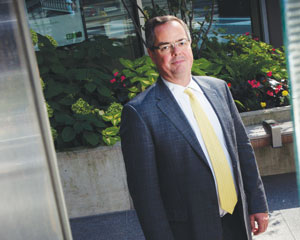Toronto’s Lawyers Feed the Hungry program is famished.

Launched in Toronto in 1998 and funded primarily through donations to the Law Society Foundation, the program is facing a major shortfall that one bencher said is putting it at risk.
“When I joined the foundation board, I would characterize the Feed the Hungry program as healthy and vibrant,” Bencher Michael Lerner, who’s also a member of the foundation’s board, told Convocation on Sept. 24. “In the last few years, sadly to say, there have been times when it has been approaching, if not on, life support.”
Ian Hull, co-founder of Hull & Hull LLP and chairman of the foundation’s board of trustees, noted the situation was urgent as he asked for support during remarks to Convocation. “While the board is doing as much as it can do, we need a collective effort and it’s urgently needed to maintain this program.”
Hull said that when the program began, volunteers provided hot meals once a week in Osgoode Hall’s cafeteria. That blossomed over the years to four hot meals each week all year with about 3,500 people served each month in Toronto. All told, including Lawyers Feed the Hungry programs in Ottawa, London, and Windsor, Ont., the programs have served hot meals to more than three million people since the beginning and average about 100,000 people per year. Of that 100,000 annual average, Hull said about 60,000 people come through Toronto’s program. But despite being the busiest of the programs, it’s also the one that’s struggling the most financially.
“Historically, the funding of the program has been reliant on phenomenal efforts by some of the founders, we got funding through what I would call one-offs, and the program was vibrant for many years,” said Hull, noting the Law Society of Upper Canada provides staff volunteers to help with the meals, space at Osgoode Hall, and administrative support to keep operating costs down. “Now, the program is funded essentially through ad hoc donations and fundraising efforts. We are, in the Toronto program, facing some tremendous change in both the funding and the fundraising.”
The result, he said, is a significant funding shortfall of about $150,000. “That shortfall is what we’re projecting as a serious problem,” he said, noting the program has already felt the impact. “In 2014, we had to reduce the number of meals because we were projecting a significant problem with funding.”
Marion Boyd, a past chairwoman of the board, says the Toronto program is the only one that actively serves meals rather than purchasing food for other organizations to do so. That, along with donor fatigue, is why Toronto’s program is struggling more than the others, she says.
“But I find it very puzzling and difficult to understand why there’s such a problem in Toronto,” she adds.
“The Ottawa, London, Windsor programs are not struggling the way Toronto is because they are not as open-ended, but I can’t get my head and heart around why there is such a problem there.”
Hull said he hopes law society members and legal professionals will stand behind the program they helped launch almost 20 years ago. “Assist with the program tangibly. Help us secure financial support,” he said.
“Your links to the legal community are what is going to save the program and is what is going to maintain it on a long-term basis. We were trying the conventional steps. We were reaching out to the law firms and looking at all the revenue streams we would normally do, but we need some help. Otherwise, without some significant effort on the part of the collective group, we’re going to be looking at, operationally, real difficulties in the next two years for the Toronto program itself.”
In the meantime, a fundraising event for the program will take place on Nov. 10 at the Rivoli on Queen Street West in Toronto. Hosted by Neuberger & Partner LLP, Hull & Hull, the Toronto Lawyers Association, and the foundation, there will be pool, a silent auction, and refreshments. More details are available at lawyersfeedthehungry.ca/toronto.html.

 Launched in Toronto in 1998 and funded primarily through donations to the Law Society Foundation, the program is facing a major shortfall that one bencher said is putting it at risk.
Launched in Toronto in 1998 and funded primarily through donations to the Law Society Foundation, the program is facing a major shortfall that one bencher said is putting it at risk.